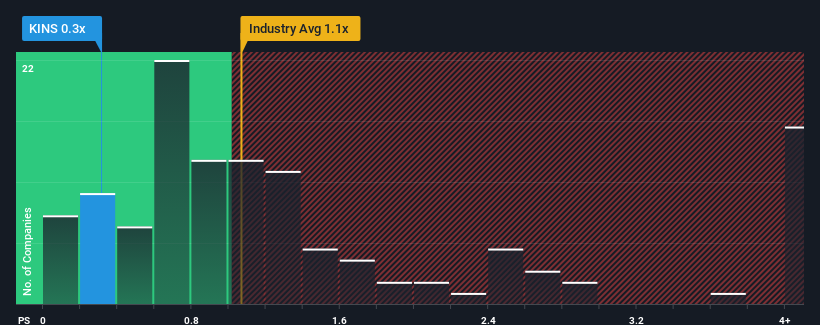- United States
- /
- Insurance
- /
- NasdaqCM:KINS
Kingstone Companies, Inc.'s (NASDAQ:KINS) Price Is Right But Growth Is Lacking

Kingstone Companies, Inc.'s (NASDAQ:KINS) price-to-sales (or "P/S") ratio of 0.3x may look like a pretty appealing investment opportunity when you consider close to half the companies in the Insurance industry in the United States have P/S ratios greater than 1.1x. Although, it's not wise to just take the P/S at face value as there may be an explanation why it's limited.
View our latest analysis for Kingstone Companies

How Has Kingstone Companies Performed Recently?
Kingstone Companies has been doing a good job lately as it's been growing revenue at a solid pace. One possibility is that the P/S is low because investors think this respectable revenue growth might actually underperform the broader industry in the near future. Those who are bullish on Kingstone Companies will be hoping that this isn't the case, so that they can pick up the stock at a lower valuation.
Want the full picture on earnings, revenue and cash flow for the company? Then our free report on Kingstone Companies will help you shine a light on its historical performance.Is There Any Revenue Growth Forecasted For Kingstone Companies?
The only time you'd be truly comfortable seeing a P/S as low as Kingstone Companies' is when the company's growth is on track to lag the industry.
Retrospectively, the last year delivered a decent 11% gain to the company's revenues. The solid recent performance means it was also able to grow revenue by 9.8% in total over the last three years. So we can start by confirming that the company has actually done a good job of growing revenue over that time.
Comparing the recent medium-term revenue trends against the industry's one-year growth forecast of 6.0% shows it's noticeably less attractive.
With this in consideration, it's easy to understand why Kingstone Companies' P/S falls short of the mark set by its industry peers. It seems most investors are expecting to see the recent limited growth rates continue into the future and are only willing to pay a reduced amount for the stock.
The Key Takeaway
Using the price-to-sales ratio alone to determine if you should sell your stock isn't sensible, however it can be a practical guide to the company's future prospects.
In line with expectations, Kingstone Companies maintains its low P/S on the weakness of its recent three-year growth being lower than the wider industry forecast. Right now shareholders are accepting the low P/S as they concede future revenue probably won't provide any pleasant surprises. If recent medium-term revenue trends continue, it's hard to see the share price experience a reversal of fortunes anytime soon.
There are also other vital risk factors to consider and we've discovered 4 warning signs for Kingstone Companies (2 are concerning!) that you should be aware of before investing here.
If strong companies turning a profit tickle your fancy, then you'll want to check out this free list of interesting companies that trade on a low P/E (but have proven they can grow earnings).
Valuation is complex, but we're here to simplify it.
Discover if Kingstone Companies might be undervalued or overvalued with our detailed analysis, featuring fair value estimates, potential risks, dividends, insider trades, and its financial condition.
Access Free AnalysisHave feedback on this article? Concerned about the content? Get in touch with us directly. Alternatively, email editorial-team (at) simplywallst.com.
This article by Simply Wall St is general in nature. We provide commentary based on historical data and analyst forecasts only using an unbiased methodology and our articles are not intended to be financial advice. It does not constitute a recommendation to buy or sell any stock, and does not take account of your objectives, or your financial situation. We aim to bring you long-term focused analysis driven by fundamental data. Note that our analysis may not factor in the latest price-sensitive company announcements or qualitative material. Simply Wall St has no position in any stocks mentioned.
About NasdaqCM:KINS
Kingstone Companies
Through its subsidiary, provides property and casualty insurance products to individuals in the United States.
Exceptional growth potential with proven track record.
Market Insights
Community Narratives


